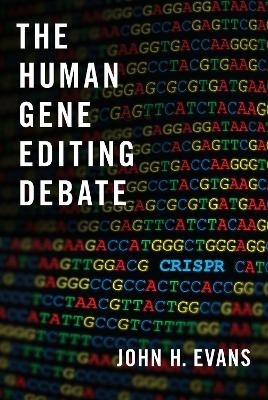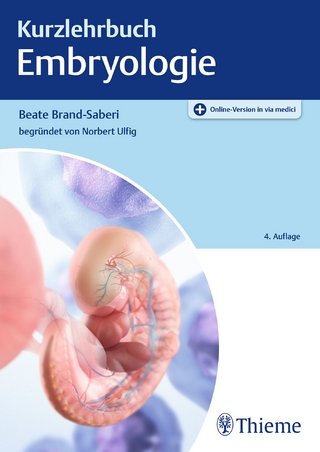
The Human Gene Editing Debate
Seiten
2020
Oxford University Press Inc (Verlag)
978-0-19-751956-1 (ISBN)
Oxford University Press Inc (Verlag)
978-0-19-751956-1 (ISBN)
- Lieferbar
- Versandkostenfrei
- Auch auf Rechnung
- Artikel merken
In 2018 the first genetically modified babies were reportedly born in China, made possible by the invention of CRISPR technology in 2012. This controversial advancement overturned the pre-existing moral consensus, which had held for over fifty years before: while gene editing an adult person was morally acceptable, modifying babies, and thus subsequent generations, crossed a significant moral line. If this line is passed over, scientists will be left without an agreed-upon ethical limit. What do we do now?
John H. Evans here provides a meta-level guide to how these debates move forward and their significance to society. He explains how the bioethical debate has long been characterized as a slippery slope, with consensually ethical use at the top, nightmarish dystopia at the bottom, and specific agreed-upon limits in between, which draw the lines between the ethical and the unethical. Evans frames his analysis around these limits, or barriers. Historically they have existed to guide scientists and to prevent the debate from slipping down the metaphorical slope into unacceptable eugenicist possibilities, such as in Aldous Huxley's novel Brave New World or the movie Gattaca. Evans examines the history of how barriers were placed, then fell, then replaced by new ones, and discusses how these insights inform where the debate may head. He evaluates other proposed barriers relevant to where we are now, projects that most of the barriers suggested by scientists and bioethicists will not hold, and cautiously identifies a few that could serve as the moral boundary for the next generation. At a critical time in this new era of intervention in the human genome, The Human Gene Editing Debate provides a necessary, comprehensive analysis of the conversation's direction, past, present, and future.
John H. Evans here provides a meta-level guide to how these debates move forward and their significance to society. He explains how the bioethical debate has long been characterized as a slippery slope, with consensually ethical use at the top, nightmarish dystopia at the bottom, and specific agreed-upon limits in between, which draw the lines between the ethical and the unethical. Evans frames his analysis around these limits, or barriers. Historically they have existed to guide scientists and to prevent the debate from slipping down the metaphorical slope into unacceptable eugenicist possibilities, such as in Aldous Huxley's novel Brave New World or the movie Gattaca. Evans examines the history of how barriers were placed, then fell, then replaced by new ones, and discusses how these insights inform where the debate may head. He evaluates other proposed barriers relevant to where we are now, projects that most of the barriers suggested by scientists and bioethicists will not hold, and cautiously identifies a few that could serve as the moral boundary for the next generation. At a critical time in this new era of intervention in the human genome, The Human Gene Editing Debate provides a necessary, comprehensive analysis of the conversation's direction, past, present, and future.
John H. Evans is the Tata Chancellor's Chair in Social Sciences, Professor of Sociology, and Co-Director of the Institute for Practical Ethics at the University of California, San Diego.
Acknowledgments
Chapter 1: Introduction
Chapter 2: The First Barriers in the Human Genetic Engineering Debate
Chapter 3: The CRISPR Era, the National Academies Report, and the Median Trait Barrier
Chapter 4: Possible Barriers Further Down the Slope
Chapter 5: Conclusion
References Cited
| Erscheinungsdatum | 02.09.2020 |
|---|---|
| Verlagsort | New York |
| Sprache | englisch |
| Maße | 211 x 145 mm |
| Gewicht | 363 g |
| Themenwelt | Medizin / Pharmazie ► Medizinische Fachgebiete ► Medizinethik |
| Studium ► 1. Studienabschnitt (Vorklinik) ► Histologie / Embryologie | |
| Studium ► Querschnittsbereiche ► Geschichte / Ethik der Medizin | |
| Naturwissenschaften ► Biologie | |
| Sozialwissenschaften ► Soziologie | |
| ISBN-10 | 0-19-751956-3 / 0197519563 |
| ISBN-13 | 978-0-19-751956-1 / 9780197519561 |
| Zustand | Neuware |
| Informationen gemäß Produktsicherheitsverordnung (GPSR) | |
| Haben Sie eine Frage zum Produkt? |
Mehr entdecken
aus dem Bereich
aus dem Bereich
Zytologie, Histologie und mikroskopische Anatomie
Buch | Hardcover (2022)
Urban & Fischer in Elsevier (Verlag)
CHF 75,60


